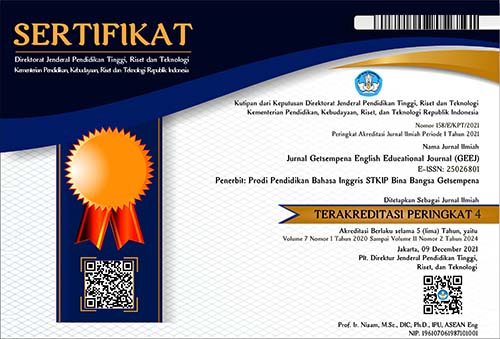BENEFITING FROM RUANGGURU FOR TEACHING ENGLISH: TEACHER’S PERSPECTIVE
Abstract
Technology has been successfully attracting human’s life, including in education. It can be seen that there are a lot of online learning especially in English language learning that can be accessed by everyone in everywhere. In Indonesian context, Ruangguru is an example of an online course that most popular used nowadays. This paper aims at exploring the way of teaching practices that used by teachers and challenges they faced in teaching English in Ruangguru. This study is a descriptive qualitative using interview as the instrument of data. The respondents of this present study are teachers who teach English from different level of students and learning programs that were chosen by snowball sampling. This study found that most of the teachers have similar methods of teaching such as preparing materials reading and having knowledge before delivering lesson to students. The teachers also faced corresponding challenges such as internet connection and difficult question that should be answered directly.
References
Ali, S. (2015). Sejak Dibuka April 2014, Ruangguru.com Tumbuh 25% Per Bulan. SWA Trends Media. Accessed from https://swa.co.id/swa/trends/technology
Alkhezzi, F., & Al-Dousari, W. (2016). The Impact of Mobile Learning on ESP Learners' Performance. Journal of Educators Online. 13(2), 73–101.
Anggraeni, T. (2018). Perancangan Promosi Fitur Ruang Guru Sebagai Sarana Belajar Digital. Universitas Telkom Indonesia.
Dewi, R K. (2018). Analisis Kualitas Website Ruang Guru.com Menggunakan Metode Webqual 4.0. Universitas Telkom Indonesia.
Gangaiamaran, R & Pasupathi, M. (2017). Review on Use of Mobile Apps for Language Learning. International Journal of Applied Engineering Research. 12 (21), 11242-11251.
Garrison, D. R. & Anderson, T. (2003). E-learning in the 21st century: A framework for research and practice. New York: Routledge Falmer.
Gideon, S. (2018). Peran Media Bimbingan Belajar Online “Ruang Guru” dalam Pembelajaran IPA bagi Siswa SMP dan SMA Masa Kini: Sebuah Pengantar. Jurnal Dinamika Pendidikan. 11(2): 167-182.
https://doi.org/10.33541/jdp.v11i2.813.
Kacetl, J & Klímová, B. (2019). Use of Smartphone Applications in English Language Learning—A Challenge for Foreign Language Education. Educ. Sci. 9 ( 179), 1-9. doi:10.3390/educsci9030179
Kompas. (2020). Accessed in https://money.kompas.com/read/2020/05/12/073800026/ruangguru-paling-laris-pelatihan-bahasa-inggris-favorit-peserta-kartu-prakerja?page=all
Kukulska‐Hulme, A., & Viberg, O. (2018). Mobile collaborative language learning: State of the art. British Journal of Educational Technology. 49(2), 207–218. doi: 10.1111/bjet.12580 .
Lida, U M & Eliya, I . (2019). Peran Startup Digital “Ruangguru” Sebagai Metode Long Distance Learning dalam Pembelajaran Bahasa. Edulingua Jurnal Linguistik Terapan dan Pendidikan Bahasa Inggris. 6(2), 5-16. Https://Doi.Org/10.34001/Edulingua.V6i2.1150
Maulida, L. (2018). Pengguna Ruangguru Tembus 9 Juta. Tek.id News. Accessed from https://www.tek.id
Oliver, M., and G. P. Shaw. 2003. Asynchronous discussion in support of medical education. Journal of Asynchronous Learning Networks 7 (1). Available online at http://www.aln.org/publications/jaln/v7n1/v7n1_oliver.asp
Rahayu, N. (2018). Startup Ruangguru Capai 6 Juta User Selama 2017. WE Online Jakarta. Accessed from https://m.wartaeknomi.co.id
Shoumi, A Z. (2019). Peran Multimedia dalam Pendidikan pada Aplikasi RuangGuru. Seminar Nasional Cendekiawan Ke 5 Tahun 2019.
Silvia, A. (2015). Coursera Online Course: A Platform for English Teachers’ Meaningful and Vibrant Professional Development. TEFLIN Journal. 26(2): 228-246. http://dx.doi.org/10.15639/teflinjournal.v26i2/228-246
Winarso, B. (2018). Review App Belajar di Ruang Guru, Cara Pintar Untuk Menjadi Ruang Guru. Accessed form https://dailysocial.id
Wrigglesworth, J (2020) Using smartphones to extend interaction beyond the EFL classroom. Computer Assisted Language Learning. 33:4, 413-434. DOI: 10.1080/09588221.2019.1569067.
Wrigglesworth, J., & Harvor, F. (2018). Making their own landscape: smartphones and student designed language learning environments. Computer Assisted Language Learning, 31(4), 437–458. doi: 10.1080/09588221.2017.1412986
Zou, B & Li, J. (2015). Exploring mobile apps for English language teaching and learning. In Helm, Francesca; Bradley, Linda; Guarda, Marta; Thouësny, Sylvie (Eds), Critical CALL – Proceedings of the 2015 EUROCALL Conference, Padova, Italy (pp. 564-568). Research-publishing.net. https://doi.org/10.14705/rpnet.2015.000394.

























